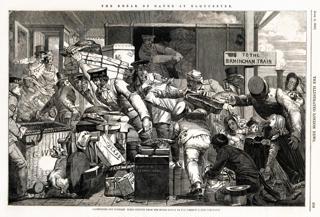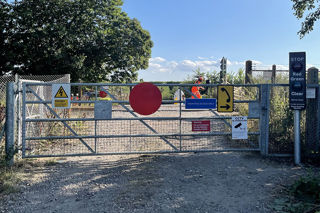There was no shortage of dropped jaws when news came through about the appointment of the recently ennobled Lord Peter Hendy as rail minister.
This was certainly a left-field move, taking everyone (perhaps even himself) by surprise. And it raises numerous questions about how he will handle the change from Network Rail chairman and long-time transport manager to being the minister responsible for railways.
There was no shortage of dropped jaws when news came through about the appointment of the recently ennobled Lord Peter Hendy as rail minister.
This was certainly a left-field move, taking everyone (perhaps even himself) by surprise. And it raises numerous questions about how he will handle the change from Network Rail chairman and long-time transport manager to being the minister responsible for railways.
However, as well as surprise, there was almost total support for Hendy, with many of my contacts in the industry praising Sir Keir Starmer for what they saw as an “inspired” appointment.
Typical of the reaction was the comment in Passenger Transport, which said: “Nobody at a senior level understands the railways, and indeed public transport, as well as Peter Hendy.”
At this point, I’d better make my position clear. I’ve known Peter Hendy since my days in the mid-1990s as transport correspondent of The Independent, when I was tipped off by my predecessor that he was a man worth talking to. I promptly mistakenly wrote his name as Kendy in my contacts book, and it remains in that long-abandoned little volume as one of the few entries under K!
Over the years, I have had many friendly conversations and lunches with Peter, interspersed with a few disagreements which occasionally have involved quite fierce text message exchanges.
That makes for what I feel is a healthy relationship between industry leaders and journalists. And Peter, to his credit, has always been prepared to engage in discussions and to explain the thinking behind decisions - rather than, like many senior people in the industry, hiding behind bland official statements.
One final disclaimer: despite these occasional disputes, Peter has kindly agreed to write the introduction for the new version of my history of Britain’s railways, Fire & Steam, due to be published in the autumn to mark the 200th anniversary of the Stockton & Darlington Railway.
When I first knew him, he was managing director of a bus company that was part of London Transport, but then he soon became a member of the management buyout team which took over the operations.
Within a few years, the company was sold to FirstGroup, enabling him to cash in his shares. Subsequently, he has used some of that money to buy two Routemasters, which he enjoys driving for many charity events.
More importantly, with his experience as a bus manager, he was appointed first as Director of Surface Transport and later as Transport Commissioner for the newly created Transport for London.
And it was as commissioner that he showed his political skills, which will be much needed in his new role. Appointed in 2006, during Ken Livingstone’s second term as London Mayor, remarkably he survived the transition (again much to the surprise of many transport commentators, including this one) when Boris Johnson took over in 2008. He remained in post until 2015, near the end of Johnson’s term, and then quickly became chairman of Network Rail - another surprise among many in the industry.
Straddling the Livingstone and Johnson eras could only have been accomplished by a consummate politician. And there were moments when he was sorely tested, such as Johnson’s insistence on a new bus design - ‘the new Routemaster’, which pandered to his boyhood memories of ‘hopping on a bus’ at traffic lights.
The bus was a daft innovation, with two staircases to take in the rear platform, which under modern health and safety rules had to have a door preventing anyone just ‘hopping’ on.
Briefly, millions of Transport for London pounds were wasted on ‘conductors’ who, in this age of Oyster and contactless travel, did nothing but stand at the platform watching the world go by.
The bus was specifically designed (at great cost) for Transport for London, and no others of that design have ever been sold by Wrightbus, the manufacturer. It replaced the bendybus, which was a far more efficient people carrier. And, embarrassingly, the capacity of the new bus had to be limited because it was too heavy.
But Hendy was forced to accede to these decisions, even driving the new bus for part of its inaugural route, while knowing that the concept was fundamentally flawed and a piece of misguided Johnson nostalgia.
In a way, oddly, this augurs well for his role as minister. He is no longer a free man to express his views and carry out whatever policies he supports, tempered only by fellow board members. Now he is part of a ministerial team - indeed, a Labour team, despite his having been ennobled as a crossbencher, and therefore subject to party discipline.
This is going to be a fascinating watch. Over the past few months, I have disagreed with the move to put Network Rail at the top of Great British Railways, overseeing the rest of the railway.
Many industry leaders want to see an independent GBR with oversight over both operators and the infrastructure manager, because they are concerned that what is basically an engineering company will not act in passengers’ best interests.
While the Conservatives were undoubtedly wedded to putting NR at the top, Labour’s shadow team prevaricated.
New Transport Secretary Louise Haigh stated repeatedly that she wanted to be the passenger in chief, and certainly her vision seemed to be that GBR should control the industry, not simply be a ‘guiding mind’.
Before the election, Hendy defended very strongly the position of Network Rail at the top of the industry, arguing that there was no other suitable organisation to take on that role.
Now, of course, he will have a role in setting up the new structure. But it will not be up to him to decide on the future role of Network Rail. He may even be required to implement a structure that he does not think is the optimal one, if that is the decision of his Labour colleagues. Collective responsibility is the name of the game for ministers.
It’s not the only dilemma he faces. In the past, Hendy has been very critical of some of the actions of the trade unions, but now the first priority of the Labour administration has to be to stop the industrial action which has been so damaging to performance in recent months, and helped to create an atmosphere of despair in the industry.
Again, he may have to do a ‘Boris bus’ reverse ferret, and accede to demands from the ‘brothers and sisters’ which he personally thinks should not be agreed.
Hendy will now have to demonstrate every facet of those political skills that enabled him to shift seamlessly from Livingstone to Johnson, and then take up a post with a railway company after years focusing on buses.
It is a challenge I am sure he will relish, but I suspect there will not be much time for jaunts driving his beloved Routemasters.
To read the rest of this column and Wolmar's column every fortnight, Subscribe today and never miss an issue of RAIL. With a Print + Digital subscription, you’ll get each issue delivered to your door for FREE (UK only). Plus, enjoy an exclusive monthly e-newsletter from the Editor, rewards, discounts and prizes, AND full access to the latest and previous issues via the app.
Login to continue reading
Or register with RAIL to keep up-to-date with the latest news, insight and opinion.


















Login to comment
Comments
No comments have been made yet.